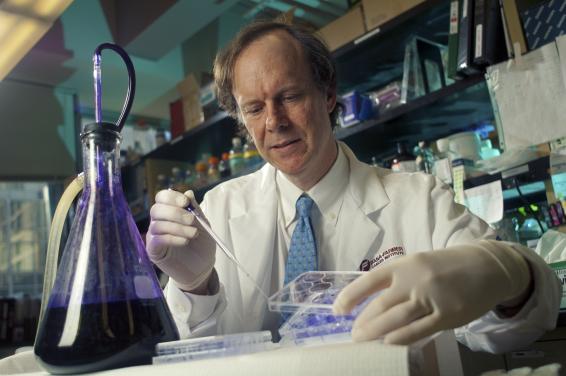
Credit: Dana-Farber Cancer Institute
William G. Kaelin Jr., MD, of Dana-Farber Cancer Institute, Harvard Medical School, and Brigham and Women’s Hospital has been named a winner of the 2019 Nobel Prize in physiology or medicine.
This award is administered by the Nobel Foundation and given once a year for outstanding discoveries in the fields of life sciences and medicine. It is one of five Nobel Prizes established in 1895 by Swedish chemist Alfred Nobel.
The Nobel was awarded jointly to Kaelin jointly, Sir Peter J. Ratcliffe and Gregg L. Semenza for their discoveries of how cells sense and adapt to oxygen availability.
The Nobel announcement comes after the three scientists were named winners of the 2016 Lasker Award for medical science by the Albert and Mary Lasker Foundation. The Lasker is America’s most prestigious biomedical award, and many of its recipients have won the Nobel Prize. The three scientists recently won another major award: They received the 2018 Massry Prize given by the Meira and Shaul G. Massry Foundation to recognize outstanding contributions to the biomedical sciences and the advancement of health. Kaelin and his co-recipients shared the $200,000 prize conferred by the foundation. Twelve recipients of the award, established in 1996, have gone on to receive the Nobel Prize.
Kaelin also has been an Investigator of the Howard Hughes Medical Institute since 1998.
In his Dana-Farber laboratory, Kaelin has focused on why mutations in genes known as tumor-suppressor genes can lead to cancer. One such tumor-suppressor gene called VHL, when mutated, causes von Hippel Lindau syndrome, a rare disorder that makes patients likely to develop kidney cancer.
Studying VHL led Kaelin and his co-awardees to a landmark discovery – the molecular explanation to a long-standing biological puzzle: How does the body sense and adapt to changes in oxygen – for example, when people adjust to thinner air at high altitudes.
Pursuing this question, he discovered that the VHL protein normally helps regulate the levels of an oxygen-sensitive protein called HIF, which can trigger or suppress the production of red blood cells and the formation of new blood vessels, and discovered the molecular switch that renders HIF oxygen-sensitive. Cancer cells with mutated VHL genes commandeer this system to surround themselves with new blood vessels – a process called angiogenesis – to feed their growth.
Kaelin found that the tumor suppressor gene mutation causes kidney tumors to churn out large amounts of a protein, VEGF, which helps provide the tumors with an extra blood supply to fuel the cancer’s growth. His work on the VHL protein helped to motivate the eventual successful clinical testing of VEGF inhibitors for the treatment of kidney cancer.
Kaelin discovered that VHL helps control the levels of the protein HIF, which ratchets up or down the response to low oxygen, such as the production of red blood cells and new blood vessels. He showed that one form of the protein, HIF-2α, drives certain kidney cancers, and he subsequently discovered how HIF-1α is hijacked by triple-negative breast cancers. He is developing therapeutic strategies for targeting these molecules and others implicated in cancer, such as mutated enzymes IDH1 and IDH2, with designer drugs.
###
In addition to the Nobel and Lasker awards, Kaelin and two collaborators earned the 2010 Canada Gairdner International Award and the Grand Prix of the Fondation Lefoulon-Delalande from the Institute of France in June 2012, for contributions to the field of cardiovascular research.
Kaelin also has received the Science of Oncology Award from the American Society of Clinical Oncology, the Princess Takamatsu Award from the American Association for Cancer Research, the Steven C. Beering Award, and the Wiley Prize in Biomedical Sciences.
Media Contact
Ellen Berlin
[email protected]
617-632-5357
Original Source
https:/




